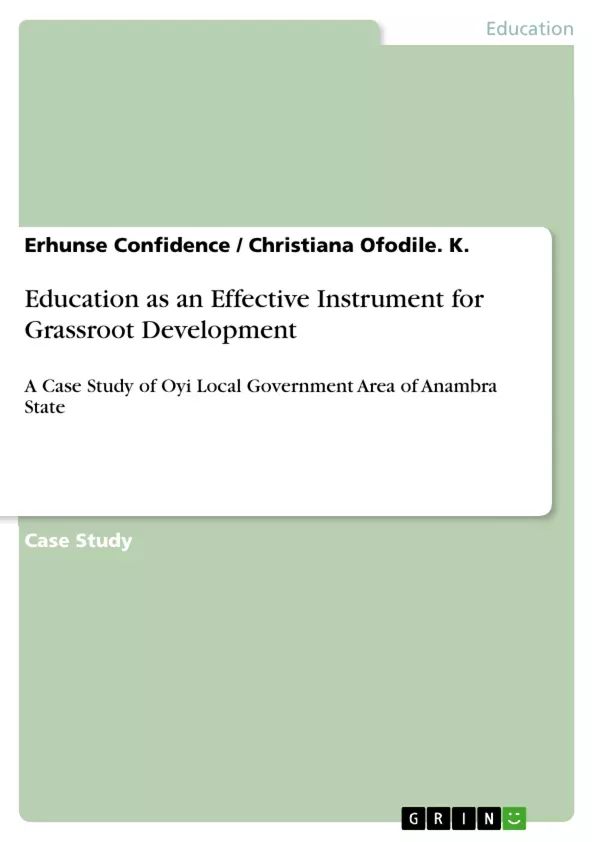This study focused on education as an effective instrument for grassroot development in Nigeria with particular reference to Oyi Local Government Area of Anambra state. The subject used for the study includes civil servants and private sectors. A total of one hundred and sixty copies of questionnaire were designed for the study was administered. The relevant data collected were analyzed using chi-square. The result shows that educational can bring awareness in the society change that will lead to developments and there is human capital development that leads to the improved standard of living at the grassroots level.
Education is an activity we all feel that we know something about having had practical experience of it. Nwosu (2014) defined education as the process of socializing the individuals to develop his/her capabilities, and abilities to acquire knowledge, skills, habits, interest, attitudes and behaviours that enable the individual adjust and respond to the environmental conditions in order to function effectively in the society for maximal personal and national development. Dewey (1963) defined education as a fostering, a nurturing and a cultivating process. This definition implies that education leads to development or growth.
Okoh, Ejedimu and Okafor (2013) noted that education is essential for survival and social change in the modern society. It is the foundation upon which physical and technological developments rest, as well as a veritable tool in the development of any nation especially developing ones. Thus, the value and functionality of nay education system lies in its ability to actualize the goals of education which emphasizes on self development of learners and usefulness to the socio-political and economic well being of the country (Odunayo and Olujuwon, 2010).
Table of Contents
- Introduction
- Statement of the Problem
- Purpose of the Study
- Research Questions
- Hypotheses
- Significance of the Study
- Scope of Study
- Research Design
- Sampling Technique and Sample Size
- Instrument of Data Collection and Procedure
- Method of Data Treatment and Analysis
- Analysis of Data and Discussions
- Conclusions
- Recommendations
- Reference
Objectives and Key Themes
This study aims to investigate the role of education as an effective instrument for grassroots development, specifically focusing on Oyi Local Government Area in Anambra State, Nigeria. The research explores the impact of education on societal change, human capital development, and improved living standards at the grassroots level.
- The impact of education on grassroots development.
- The relationship between education and societal change.
- The role of education in improving living standards.
- The contribution of education to human capital development.
- The effectiveness of education as a tool for development in Nigeria.
Chapter Summaries
Introduction: This chapter introduces the study, providing a broad overview of the research topic – education as a catalyst for grassroots development. It lays the groundwork by defining education from various perspectives, highlighting its significance in societal progress and national development, particularly in developing nations. The chapter also outlines the importance of education in fostering national unity, addressing social inequalities, and promoting self-actualization. It establishes a foundational understanding of education's multifaceted role within society.
Keywords
Education, grassroots development, Nigeria, societal change, human capital development, improved living standards, effective instrument.
Frequently Asked Questions: A Comprehensive Language Preview
What is the purpose of this document?
This document provides a comprehensive preview of a research study. It includes the table of contents, objectives and key themes, chapter summaries, and keywords. The preview is intended for academic use, facilitating the analysis of the study's themes in a structured manner.
What topics are covered in the study?
The study investigates the role of education as an effective instrument for grassroots development in Oyi Local Government Area, Anambra State, Nigeria. Key themes include the impact of education on societal change, human capital development, and improved living standards at the grassroots level.
What are the main research questions or objectives?
The study aims to explore the impact of education on grassroots development, the relationship between education and societal change, the role of education in improving living standards, the contribution of education to human capital development, and the overall effectiveness of education as a tool for development in Nigeria.
What is the structure of the study as outlined in the table of contents?
The study follows a standard research structure. It includes an introduction, statement of the problem, purpose of the study, research questions and hypotheses, significance and scope of the study, research design, sampling technique and sample size, data collection and procedure, data treatment and analysis, analysis and discussion of data, conclusions, recommendations, and references.
What does the introduction chapter cover?
The introduction chapter provides a broad overview of the research topic, defining education from various perspectives and highlighting its significance in societal progress and national development, especially in developing countries. It emphasizes education's role in fostering national unity, addressing social inequalities, and promoting self-actualization.
What are the key words associated with this study?
The keywords include: Education, grassroots development, Nigeria, societal change, human capital development, improved living standards, and effective instrument.
What type of research is this?
Based on the provided preview, the research appears to be quantitative or qualitative, focusing on the impact of education on various aspects of development within a specific geographical location. More details on the specific methodology would be needed to ascertain the research design.
For whom is this preview intended?
This preview is intended for academic use, enabling researchers and scholars to understand the study's scope and focus before engaging with the full research paper. It facilitates a structured and professional analysis of the themes explored in the study.
- Citation du texte
- Erhunse Confidence (Auteur), Christiana Ofodile. K. (Auteur), 2014, Education as an Effective Instrument for Grassroot Development, Munich, GRIN Verlag, https://www.grin.com/document/509862



